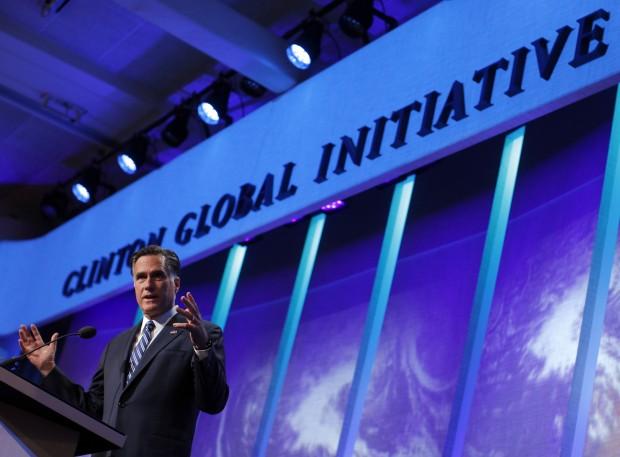Obama and Romney Offer Contrasting Approaches to Middle East
Republican presidential candidate and former Massachusetts Governor Mitt Romney speaks at the Clinton Global Initiative in New York September 25, 2012. REUTERS/Brian Snyder (UNITED STATES – Tags: POLITICS ELECTIONS USA PRESIDENTIAL ELECTION)
President Barack Obama and Republican presidential candidate Mitt Romney both delivered speeches about American foreign policy Tuesday. The two men offered contrasting visions of what America’s role should be in shaping events beyond its shores.
Mitt Romney first addressed an international audience this morning. He was speaking in New York at former President Bill Clinton’s annual conference for his Clinton Global Initiative.
It was a subdued political speech compared with some of his recent rhetoric on the campaign trail. Romney never once mentioned President Obama.
Romney devoted the bulk of his speech to his vision for foreign aid, which includes a greater emphasis on supporting private enterprise. He also briefly addressed current events in the Middle East.
Mitt Romney: “A lot of Americans, including myself, are troubled by the developments in the Middle East. Syria has witnessed the killing of tens of thousands of people. The president of Egypt is a member of the Muslim Brotherhood. Our Ambassador to Libya was assassinated in a terrorist attack. Iran is moving toward nuclear weapons capability. We somehow feel that we’re at the mercy of events, rather than shaping events.”
Romney returned to an idea he often expresses — a belief in American exceptionalism.
Mitt Romney: “I’ll never apologize for America. I believe that America has been one of the greatest forces for good the world has ever known. We can hold that knowledge in our hearts with humility and unwavering conviction.”
Later in the morning, President Obama addressed the United Nations General Assembly. There, the president offered a different vision of America’s role in the world.
President Barack Obama: “Let me be clear, just as we cannot solve every problem in the world, the United States has not and will not seek to dictate the outcome of democratic transitions abroad. We do not expect other nations to agree with us on every issue.”
But there was one issue the president said was non-negotiable: Iran cannot be allowed to develop nuclear weapons.
President Barack Obama: “America wants to resolve this issue through diplomacy, and we believe that there is still time and space to do so. But that time is not unlimited. We respect the right of nations to access peaceful nuclear power, but one of the purposes of the United Nations is to see that we harness that power for peace. Make no mistake: A nuclear-armed Iran is not a challenge that can be contained. It would threaten the elimination of Israel, the security of Gulf nations, and the stability of the global economy.”
The president ended his speech where he began — praising the life and service of American ambassador Chris Stevens, who was killed two weeks ago in Libya. The president condemned the video that sparked the outrage, but also spoke at length about the need to protect free speech, even when it’s hateful.
Every day, reporters and producers at The World are hard at work bringing you human-centered news from across the globe. But we can’t do it without you. We need your support to ensure we can continue this work for another year.
Make a gift today, and you’ll help us unlock a matching gift of $67,000!
